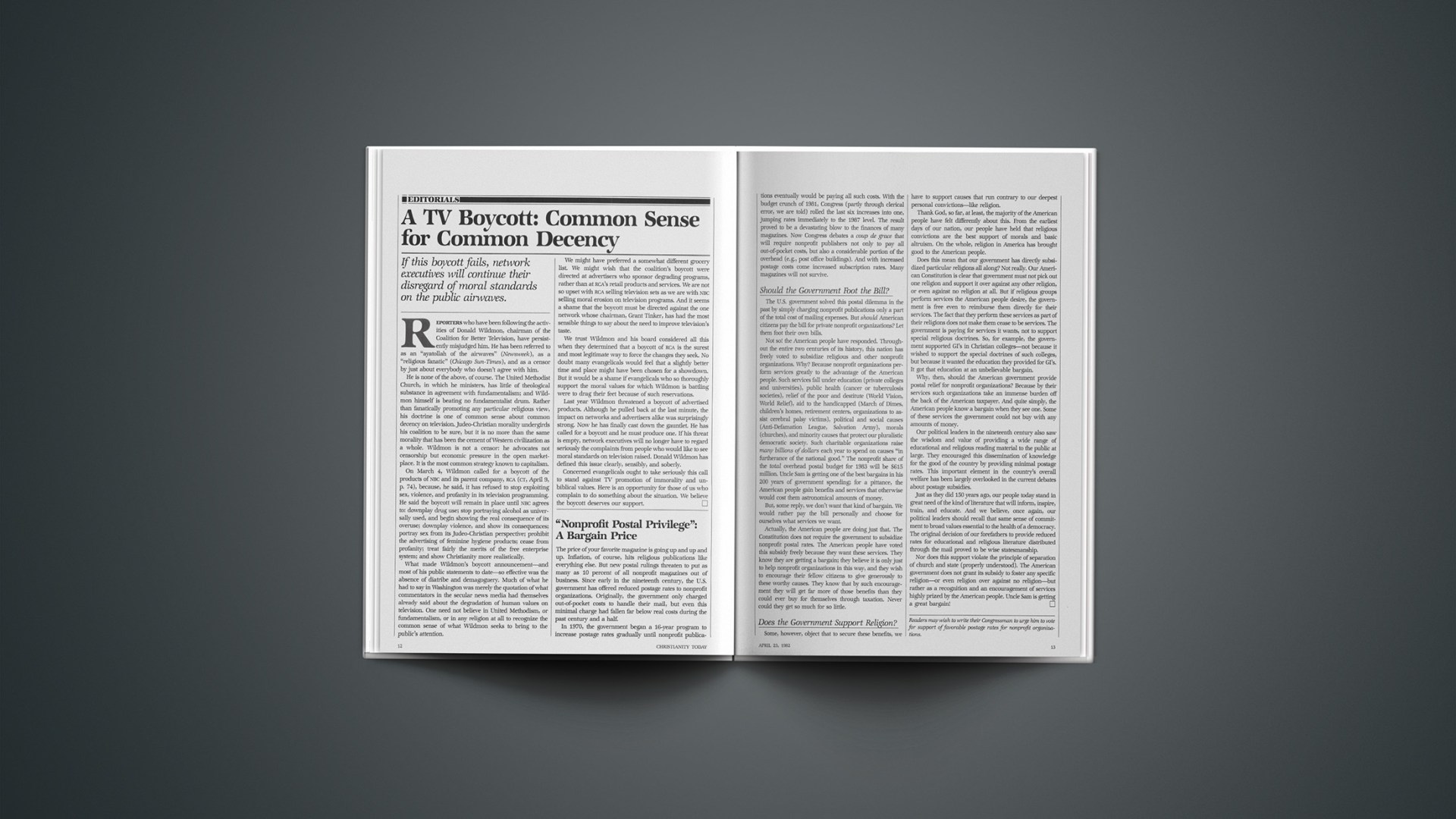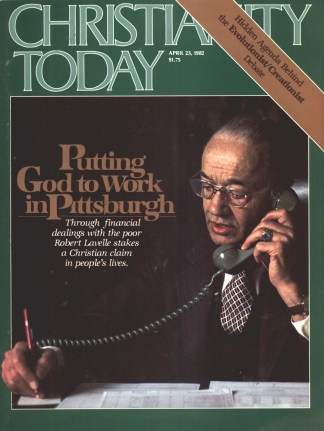If this boycott fails, network executives will continue their disregard of moral standards on the public airwaves.
Reporters who have been following the activities of Donald Wildmon, chairman of the Coalition for Better Television, have persistently misjudged him. He has been referred to as an “ayatollah of the airwaves” (Newsweek), as a “religious fanatic” (Chicago Sun-Times), and as a censor by just about everybody who doesn’t agree with him.
He is none of the above, of course. The United Methodist Church, in which he ministers, has little of theological substance in agreement with fundamentalism; and Wildmon himself is beating no fundamentalist drum. Rather than fanatically promoting any particular religious view, his doctrine is one of common sense about common decency on television. Judeo-Christian morality undergirds his coalition to be sure, but it is no more than the same morality that has been the cement of Western civilization as a whole. Wildmon is not a censor: he advocates not censorship but economic pressure in the open marketplace. It is the most common strategy known to capitalism.
On March 4, Wildmon called for a boycott of the products of NBC and its parent company, RCA (CT, April 9, p. 74), because, he said, it has refused to stop exploiting sex, violence, and profanity in its television programming. He said the boycott will remain in place until NBC agrees to: downplay drug use; stop portraying alcohol as universally used, and begin showing the real consequence of its overuse; downplay violence, and show its consequences; portray sex from its Judeo-Christian perspective; prohibit the advertising of feminine hygiene products; cease from profanity; treat fairly the merits of the free enterprise system; and show Christianity more realistically.
What made Wildmon’s boycott announcement—and most of his public statements to date—so effective was the absence of diatribe and demagoguery. Much of what he had to say in Washington was merely the quotation of what commentators in the secular news media had themselves already said about the degradation of human values on television. One need not believe in United Methodism, or fundamentalism, or in any religion at all to recognize the common sense of what Wildmon seeks to bring to the public’s attention.
We might have preferred a somewhat different grocery list. We might wish that the coalition’s boycott were directed at advertisers who sponsor degrading programs, rather than at RCA’S retail products and services. We are not so upset with RCA selling television sets as we are with NBC selling moral erosion on television programs. And it seems a shame that the boycott must be directed against the one network whose chairman, Grant Tinker, has had the most sensible things to say about the need to improve television’s taste.
We trust Wildmon and his board considered all this when they determined that a boycott of RCA is the surest and most legitimate way to force the changes they seek. No doubt many evangelicals would feel that a slightly better time and place might have been chosen for a showdown. But it would be a shame if evangelicals who so thoroughly support the moral values for which Wildmon is battling were to drag their feet because of such reservations.
Last year Wildmon threatened a boycott of advertised products. Although he pulled back at the last minute, the impact on networks and advertisers alike was surprisingly strong. Now he has finally cast down the gauntlet. He has called for a boycott and he must produce one. If his threat is empty, network executives will no longer have to regard seriously the complaints from people who would like to see moral standards on television raised. Donald Wildmon has defined this issue clearly, sensibly, and soberly.
Concerned evangelicals ought to take seriously this call to stand against TV promotion of immorality and unbiblical values. Here is an opportunity for those of us who complain to do something about the situation. We believe the boycott deserves our support.
“Nonprofit Postal Privilege”: A Bargain Price
The price of your favorite magazine is going up and up and up. Inflation, of course, hits religious publications like everything else. But new postal rulings threaten to put as many as 10 percent of all nonprofit magazines out of business. Since early in the nineteenth century, the U.S. government has offered reduced postage rates to nonprofit organizations. Originally, the government only charged out-of-pocket costs to handle their mail, but even this minimal charge had fallen far below real costs during the past century and a half.
In 1970, the government began a 16-year program to increase postage rates gradually until nonprofit publications eventually would be paying all such costs. With the budget crunch of 1981, Congress (partly through clerical error, we are told) rolled the last six increases into one, jumping rates immediately to the 1987 level. The result proved to be a devastating blow to the finances of many magazines. Now Congress debates a coup de grace that will require nonprofit publishers not only to pay all out-of-pocket costs, but also a considerable portion of the overhead (e.g., post office buildings). And with increased postage costs come increased subscription rates. Many magazines will not survive.
Should The Government Foot The Bill?
The U.S. government solved this postal dilemma in the past by simply charging nonprofit publications only a part of the total cost of mailing expenses. But should American citizens pay the bill for private nonprofit organizations? Let them foot their own bills.
Not so! the American people have responded. Throughout the entire two centuries of its history, this nation has freely voted to subsidize religious and other nonprofit organizations. Why? Because nonprofit organizations perform services greatly to the advantage of the American people. Such services fall under education (private colleges and universities), public health (cancer or tuberculosis societies), relief of the poor and destitute (World Vision, World Relief), aid to the handicapped (March of Dimes, children’s homes, retirement centers, organizations to assist cerebral palsy victims), political and social causes (Anti-Defamation League, Salvation Army), morals (churches), and minority causes that protect our pluralistic democratic society. Such charitable organizations raise many billions of dollars each year to spend on causes “in furtherance of the national good.” The nonprofit share of the total overhead postal budget for 1983 will be $615 million. Uncle Sam is getting one of the best bargains in his 200 years of government spending; for a pittance, the American people gain benefits and services that otherwise would cost them astronomical amounts of money.
But, some reply, we don’t want that kind of bargain. We would rather pay the bill personally and choose for ourselves what services we want.
Actually, the American people are doing just that. The Constitution does not require the government to subsidize nonprofit postal rates. The American people have voted this subsidy freely because they want these services. They know they are getting a bargain; they believe it is only just to help nonprofit organizations in this way, and they wish to encourage their fellow citizens to give generously to these worthy causes. They know that by such encouragement they will get far more of those benefits than they could ever buy for themselves through taxation. Never could they get so much for so little.
Does The Government Support Religion?
Some, however, object that to secure these benefits, we have to support causes that run contrary to our deepest personal convictions—like religion.
Thank God, so far, at least, the majority of the American people have felt differently about this. From the earliest days of our nation, our people have held that religious convictions are the best support of morals and basic altruism. On the whole, religion in America has brought good to the American people.
Does this mean that our government has directly subsidized particular religions all along? Not really. Our American Constitution is clear that government must not pick out one religion and support it over against any other religion, or even against no religion at all. But if religious groups perform services the American people desire, the government is free even to reimburse them directly for their services. The fact that they perform these services as part of their religions does not make them cease to be services. The government is paying for services it wants, not to support special religious doctrines. So, for example, the government supported GI’s in Christian colleges—not because it wished to support the special doctrines of such colleges, but because it wanted the education they provided for GI’s. It got that education at an unbelievable bargain.
Why, then, should the American government provide postal relief for nonprofit organizations? Because by their services such organizations take an immense burden off the back of the American taxpayer. And quite simply, the American people know a bargain when they see one. Some of these services the government could not buy with any amounts of money.
Our political leaders in the nineteenth century also saw the wisdom and value of providing a wide range of educational and religious reading material to the public at large. They encouraged this dissemination of knowledge for the good of the country by providing minimal postage rates. This important element in the country’s overall welfare has been largely overlooked in the current debates about postage subsidies.
Just as they did 150 years ago, our people today stand in great need of the kind of literature that will inform, inspire, train, and educate. And we believe, once again, our political leaders should recall that same sense of commitment to broad values essential to the health of a democracy. The original decision of our forefathers to provide reduced rates for educational and religious literature distributed through the mail proved to be wise statesmanship.
Nor does this support violate the principle of separation of church and state (properly understood). The American government does not grant its subsidy to foster any specific religion—or even religion over against no religion—but rather as a recognition and an encouragement of services highly prized by the American people. Uncle Sam is getting a great bargain!
Readers may wish to write their Congressman to urge him to vote for support of favorable postage rates for nonprofit organizations.










